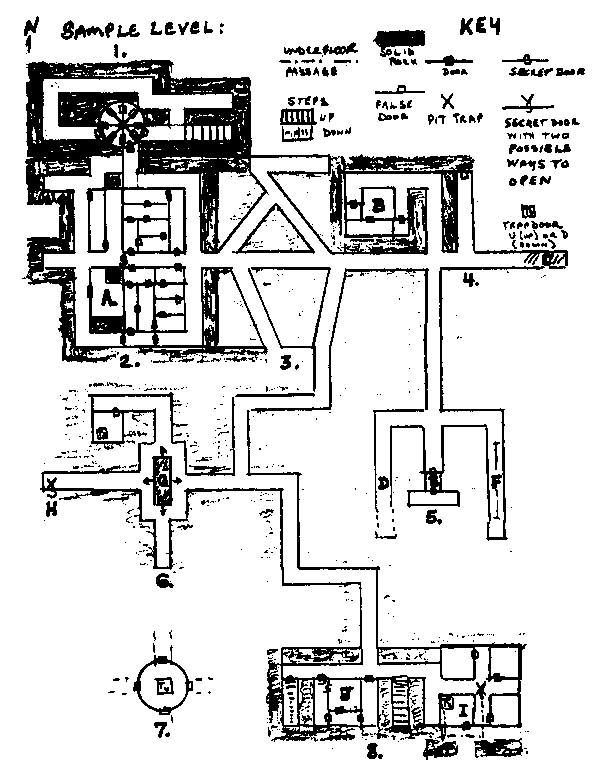 |
Gygaxian Two-Way Secret Door from the AD&D Dungeon Masters Guide (1979) |
Over on Facebook, in the Sages of Greyhawk group, James Ward (author of Metamorphosis Alpha and co-author of Gamma World) has been sharing anecdotes about his early games with Gary Gygax. In the first of these he mentioned:
"It wasn't until years later that I found out that sometimes Gary had two chambers connected to one secret door. Depending on if you pressed the right or left side of the door was the chamber you were allowed to enter."Like many of Gary's favorite dungeon tricks, we were actually warned about these all the way back in 1974 in the original Dungeons & Dragons rules. Specifically, one appears as Area H on the "SAMPLE LEVEL" map in Vol 3, The Underworld and Wilderness Adventures. The corresponding key in the upper right corner of the map shows that the standard secret door symbol with a "V" above it refers to a "secret door with two possible ways to open":
The descriptive text for the dungeon level further explains that:
"Point "H" is a two-way secret door. On a die roll of odd, let us suppose, it opens on a room to the west. Otherwise it opens on a passage south."So this example differs slightly from the version described by Ward in that it opens randomly in two directions, versus opening in two different directions depending on how it is manipulated.
At least two other variations on these doors appear in the AD&D Dungeon Masters Guide (1979). The first is in the Sample Dungeon (pages 95-96), which describes one where the alternate opening is accessed through use of a key hidden in Room 2:
"Clutched in the bony fingers is the special key which will allow the secret door at location 28. to open to the treasury room (29.) rather than to the steps which lead down to the caverns (steps down at 30.)."In this situation, if the characters don't find the key they are much more likely to end up in the (presumably) more dangerous second level caverns rather than finding the abbey treasury containing the rumored fire opal.
This secret door is shown in the excerpt of the dungeon map included at the top of this page. There, the secret door is indicated by a standard "S" with a line drawn through it indicating the wall between the two different passages it opens onto.
The second example is in APPENDIX H: TRICKS:
"DOOR, SECRET: This pivoting stone portal will always swing open to the left, giving egress to an area guarded by a basilisk. However, if a second hidden stud is found (1% chance), then it will pivot to the right and allow entry to a chamber containing a magical fountain."It's a bit unclear here if the DM is simply supposed to roll for the 1% chance when the party is making its first secret door check or whether that is the chance if continued searching is made.
Offhand, I can't think of any others, and a quick search of the Gygax modules didn't turn up anything else. Let me know if you come across any other examples.
See also:
Gygax's Dungeon Delving Level from the Hall of Many Panes, where I look at a number of his other early dungeon traps and tricks.

Hmmm. Very sneaky. I need to use that in a dungeon I'm going to build. Thank you for pointing that out.
ReplyDeleteFunnily enough, I was just refreshing myself on U&WA yesterday, wondering why I'd not thought to pinch the idea ages ago.
ReplyDelete